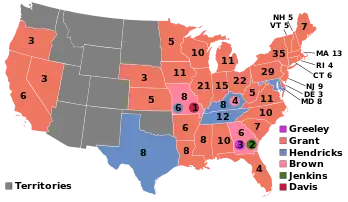1872 United States elections
The 1872 United States elections were held on November 5, electing the members of the 43rd United States Congress. The election took place during the Third Party System. The election took place during the Reconstruction Era, and many Southerners were barred from voting. Despite a split in the party, the Republicans retained control of the presidency and both houses of Congress.
| ← 1870 1871 1872 1873 1874 → Presidential election year | |
| Election day | November 5 |
|---|---|
| Incumbent president | Ulysses S. Grant (Republican) |
| Next Congress | 43rd |
| Presidential election | |
| Partisan control | Republican hold |
| Popular vote margin | Republican +11.8% |
| Electoral vote | |
| Ulysses S. Grant (R) | 286 |
| Horace Greeley (LR/D) | 66[1] |
 | |
| 1872 presidential election results. Numbers indicate the electoral votes won by each candidate. Red denotes states won by Grant. The other colors denote electoral votes for various members of the Liberal Republican and Democratic parties; Greeley did not receive electoral votes because he died after the election. | |
| Senate elections | |
| Overall control | Republican hold |
| Seats contested | 24 of 74 seats[2] |
| Net seat change | Democratic +2[3] |
| House elections | |
| Overall control | Republican hold |
| Seats contested | All 292 voting members |
| Net seat change | Republican +61[3] |
 | |
| 1872 House of Representatives election results
Democratic seat | |
In the presidential election, Republican president Ulysses S. Grant easily defeated Liberal Republican newspaper editor Horace Greeley.[4] Greeley's Liberal Republicans campaigned on civil service reform and an end to Reconstruction. Eager to defeat Grant, the Democratic Party also nominated Greeley. Greeley died after the election but prior to the meeting of the electoral college, so most of Greeley's electoral votes went to his running mate, Missouri Governor Benjamin Gratz Brown, as well as former senator Thomas A. Hendricks of Indiana.
Following the 1870 census, 49 seats were added to the House. Republicans made major gains in the House, picking up new seats while also winning seats from the Democrats.[5]
In the Senate, Republicans continued to control a commanding majority, but lost multiple seats to the Democrats and Liberal Republicans.[6]
See also
References
- Greeley died after the election, and his electoral votes were distributed to various Democrats and members of the Liberal Republican Party.
- Not counting special elections.
- Congressional seat gain figures only reflect the results of the regularly-scheduled elections, and do not take special elections into account.
- "1872 Presidential Election". The American Presidency Project. Retrieved 25 June 2014.
- "Party Divisions of the House of Representatives". United States House of Representatives. Retrieved 25 June 2014.
- "Party Division in the Senate, 1789-Present". United States Senate. Retrieved 25 June 2014.